Babies are born ready to explore the world and learn. But for the first 18 months at least, the most interesting thing in their world is you. They may only be tiny, but spending time with you is a big deal for them as it helps them form an attachment with you. And by having fun together, you can help them in so many ways. They don’t need expensive toys – just all the attention you can give them.
Playing together
There are so many benefits to playing with your baby, besides the obvious one – it’s fun! Here are some of the things that playing, talking and reading with your baby will do:
- bring you closer together
- help your baby learn to socialise, making it easier for them to form friendships later on
- help with their movement, letting their bones, muscles and heart grow strong and getting them ready to crawl and stand up
- boost the growth of their brain
- make a positive difference to your baby’s health and happiness in the future.
You don’t need lots of time, toys or expensive equipment for playing, talking and reading together – you can fit these little activities in easily with your everyday routine. And because they will all help your baby learn to play for longer before they get bored, it may even mean fewer tears too! So why not have a go? Here are some great tips to get you started.
Play tips from the parents
Tip #1: Peek-a-boo
Hide behind your hands then surprise your wee one by reappearing – boo! For extra giggles, you can make funny noises. You can also try this with your baby’s toys. This simple game teaches them that even if they can’t see you, you still exist!
This short video shows you how you can use the muslin cloth in your Baby Box to play peek-a-book with your wee one.
Tip #2: It's tickle time!
Tickling can be a lovely way to bond. When you're changing your baby’s nappy, tickle their toes or tummy – they love how it feels.
Tip #3: Hands-on play
As your wee one gets older, they might try grabbing everything around them. So pop them on a blanket and scatter some baby-safe objects around them, like the teething ring and comforter toy in your Baby Box. And give them a kiss and a ‘well done’ when they reach them.
When they’re learning how to stand up, help them practise by getting them to reach for toys on your sofa.
Tip #4: Drawing
Try drawing some shapes, lines or figures on a piece of paper while your baby watches. You could tell them a little story as you do, or help them hold the pencil or crayon and have a go themselves. Who cares how good you are at drawing? Your baby won’t judge your artistic skills!
Tip #5: Get creative
It’s never too early to start with art. Messing around with pencils, crayons and baby-safe paints are a great way to have fun together while helping them develop different skills. Just letting them make marks and showing you appreciate what they’ve done helps build their confidence. For lots of fun, creative ideas, check out the Art at the Start project here.
Tip #6: Passing games
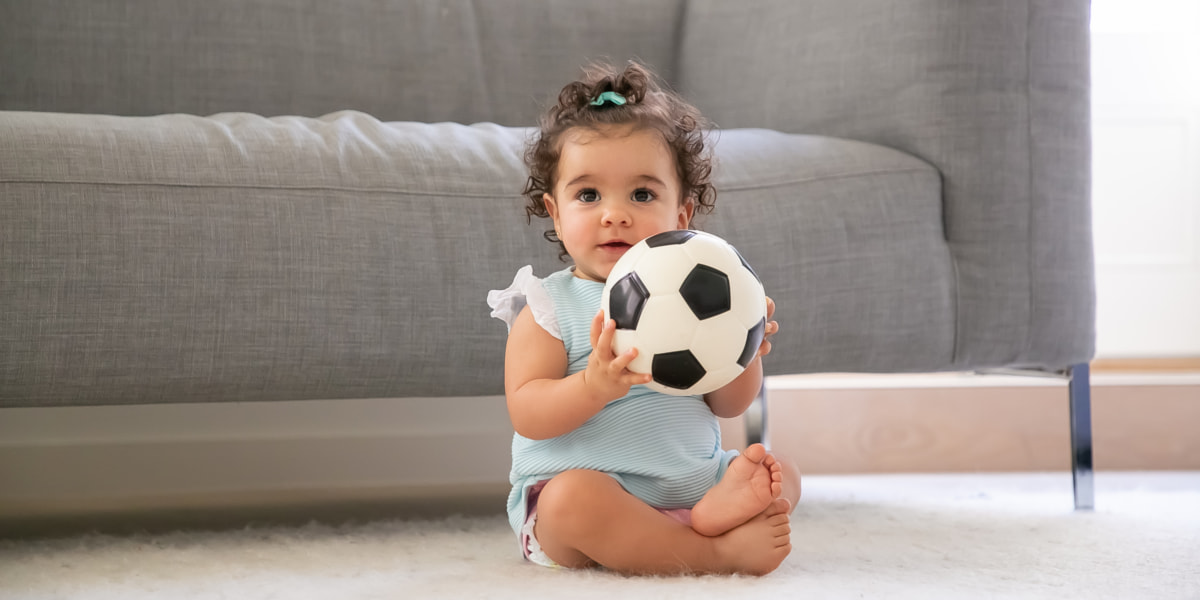
Once your little one is sitting up happily, you may want to start playing some ball games. Passing a soft ball or rolled up sock to each other is a good way to start. Sit close together to begin with, and as your baby finds it easier to do, you can start moving further apart.
Singing together
Singing to your baby while you go about your day is a great way to keep them entertained. And babies learn by hearing your voice. They don’t care if you’re not Taylor Swift – they’ll love your voice more!
How about trying this simple rhyme – all wee ones love it!
"Round and round the garden, like a teddy bear" – move your finger in circle on your child’s palm.
"One step, two step," – walk your fingers up their arm.
"Tickle you under there!" – tickle them under their armpit – or anywhere else that’s ticklish!
You’ll find lots more rhymes and songs like this in the Bookbug Song and Rhyme Library.
Sharing stories
Just because your baby can’t read, it doesn’t mean they won’t enjoy a story. Your voice will soothe them, and it’s a lovely excuse for a cuddle. You might think they don’t know what the words mean, but babies’ brains are like wee sponges – you’d be amazed what they pick up even when they’re tiny. You could also try showing them books with different textures for them to feel – this will help them get interested in books.
Watch this short video to see how you can use the books in your Baby Box to connect with your wee one.
Low cost/no cost toys
You don’t need to splash out on expensive toys to keep your wee one entertained. Here are some easy ideas that will keep them busy without breaking the bank.
Tip #1: Use everyday items as toys
Babies don't need lots of new toys to be happy. Wooden spoons, plastic tumblers, a drink bottle filled with colourful items and sealed shut – anything can be a toy! Just make sure it can’t be swallowed, and there are no loose, sharp or removable parts.
Tip #2: Mirror mirror
Who’s that in the mirror? Try letting your baby look at their reflection and see if they recognise themselves.
Tip #3: Shake it up
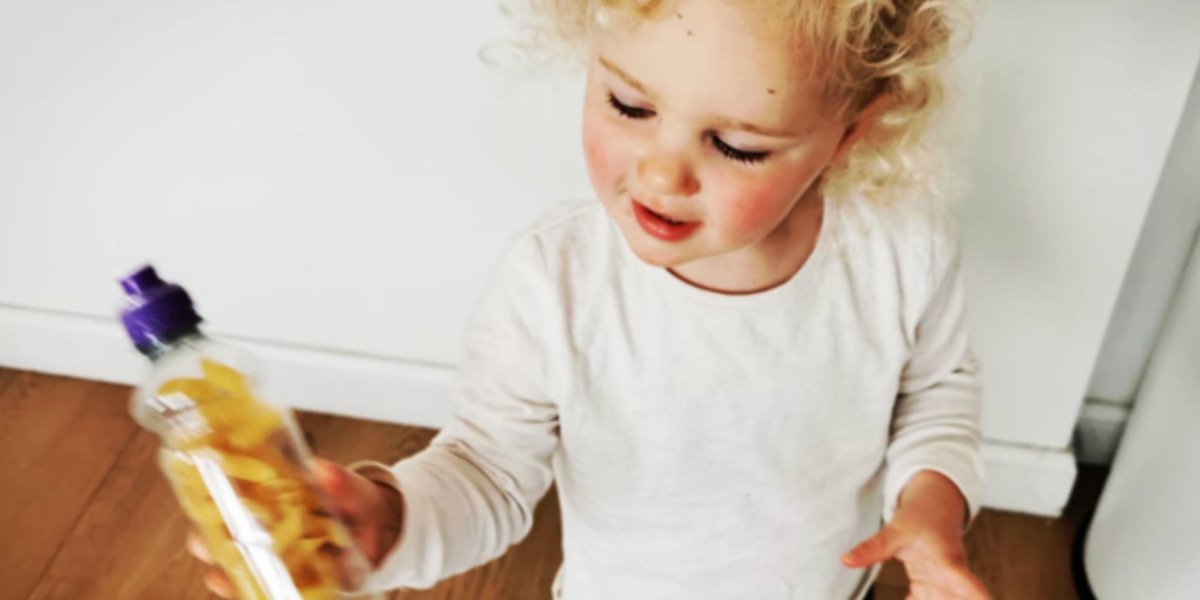
You’ve probably noticed by now that babies love making noise! Make some simple instruments for your wee one by filling a plastic bottle with pasta or rice (make sure the lid is very firmly shut so they can’t open it and don’t leave them alone with these). Or why not give them some pots and a wooden spoon to bang them with? Then put on the radio and watch them play along!
Tip #4: Make a mobile
Making a mobile is great way to keep babies interested as their eyes develop and they focus more. They’re easy to make at home too. Just cut out different colourful objects from magazines, back them with card, attach them to string on a coat hanger and you’ve got an instant mobile!
If you have older kids, why not get them to make the mobile? That way, everyone’s busy. If they need some inspiration, this video from CBeebies shows them how to make a planet mobile that’s out of this world!
Making life playful
Your baby is born ready to start communicating with you. Babies like to 'chat' with their parents from day one. The tuneful, sing song voice that parents naturally use with babies isn’t silly – it’s exactly what babies like to respond to. It can take a baby at least 10 seconds to get a response together, so take your time to see what your baby does before you talk back.
It might feel difficult finding the time to slow down and chat with your baby. But your attention is the best thing you can give them. So try to make time to talk and play with them throughout the day. It could be getting them to help you put clothes away, or singing songs together while you change their nappy or do the dishes. Babies are complicated wee things but their needs are fairly simple, they just want to feel cared for and safe.
You can find out more about connecting with your wee one here.
Calm time
We all need space. Even babies. So you don’t need to be interacting with your baby every waking hour. Babies are fine to amuse themselves: watching the hustle and bustle of family life can be very entertaining, though keep an eye on them.
Spending time with your baby is really important, but too much stimulation can be confusing for them. Periods of 'down time' when they can just chill out are good for them too. It helps them process all the information they are taking in.
Look out for signs that your baby needs to pause the playtime – sometimes they turn their head away to show this. Your baby will let you know when they’re ready for some more playing and talking, or need something else, so all you have to do is watch out for those signs.
What the professionals say
"Connecting with your child might happen straight away, but for some parents it may take days, or even weeks – and all of this is normal. Child experts say relationships form from an intense feeling of attachment – a strong desire to care for and protect your baby. Over time, this creates an overwhelming sense of love and affection. Playing together can help build strong bonds. This can be anything from a family stroll around the block or having a cuddle together while playing peek-a-boo at home.
“Playing with your baby doesn’t need to take a lot of time or be expensive. There will be plenty of things around the house that you can use to entertain them. Just looking at pictures in books or magazines, singing songs or reading nursery rhymes together can be wonderful fun for both of you. The most important thing is to get down to their level, get your babies attention and have fun together. Your baby will learn more from you than they will from any toy.”
More information
Remember that if you have any worries about your relationship with your wee one, it always helps to talk things through with someone. You can speak to your health visitor – and you can also read about creating a secure attachment with your baby on the Ready Steady Baby website.
 Activities & Play
Activities & Play Behaviour
Behaviour Childcare
Childcare Development & Growing Up
Development & Growing Up Family, Friends & Relationships
Family, Friends & Relationships Feeding Your Baby
Feeding Your Baby Food & Eating
Food & Eating Health & Safety
Health & Safety Mental Health & Wellbeing
Mental Health & Wellbeing Money & Work
Money & Work Online Behaviour & Safety
Online Behaviour & Safety Pregnancy & First Days
Pregnancy & First Days School & Education
School & Education Sleep
Sleep


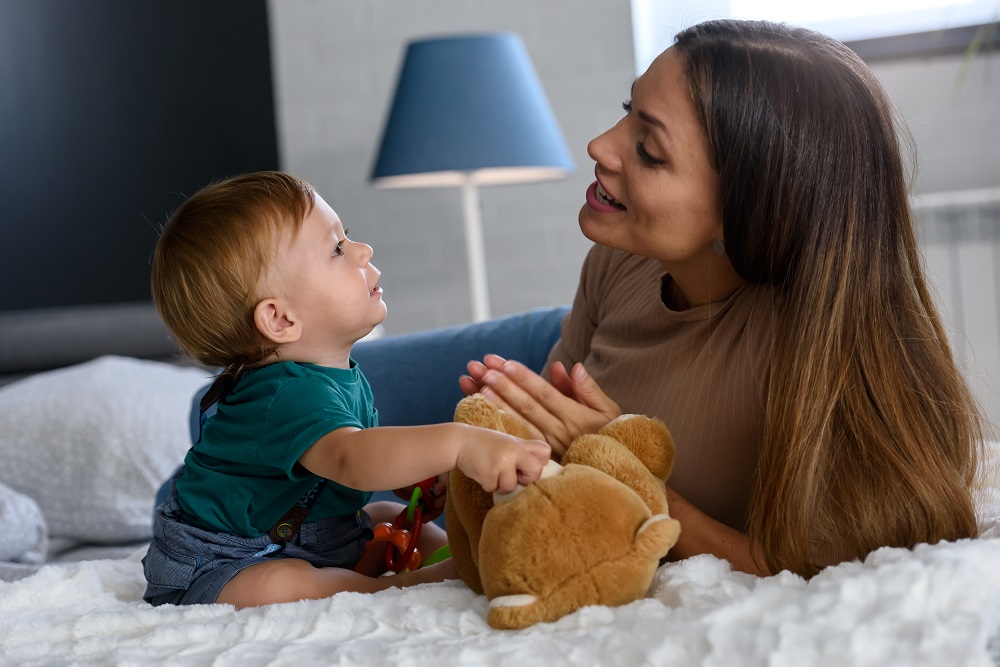
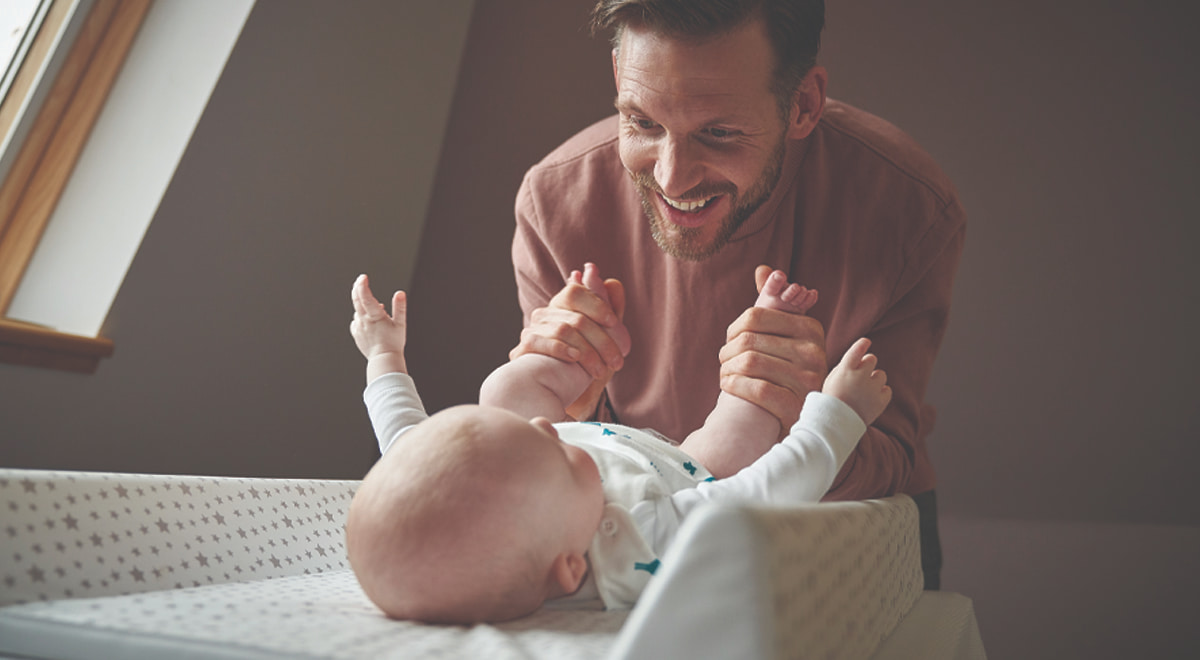
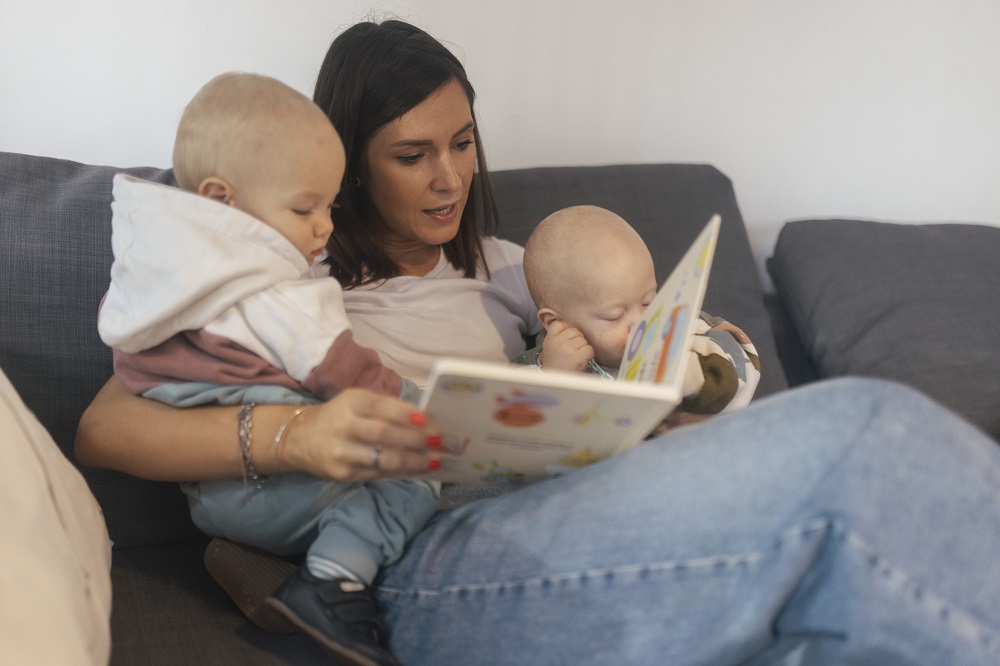

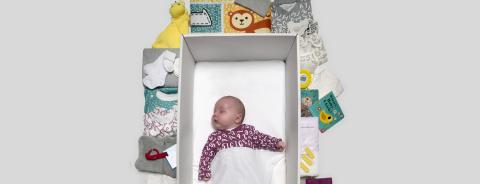

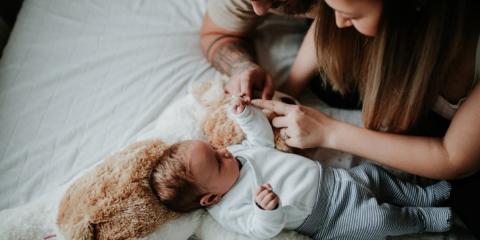
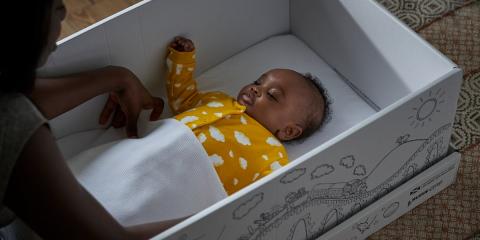

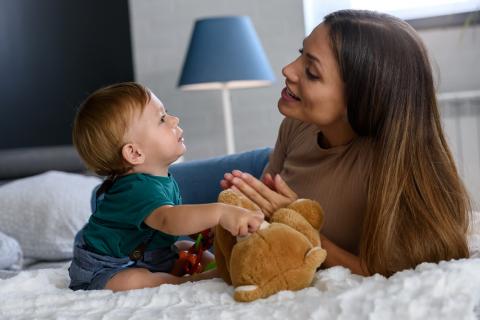
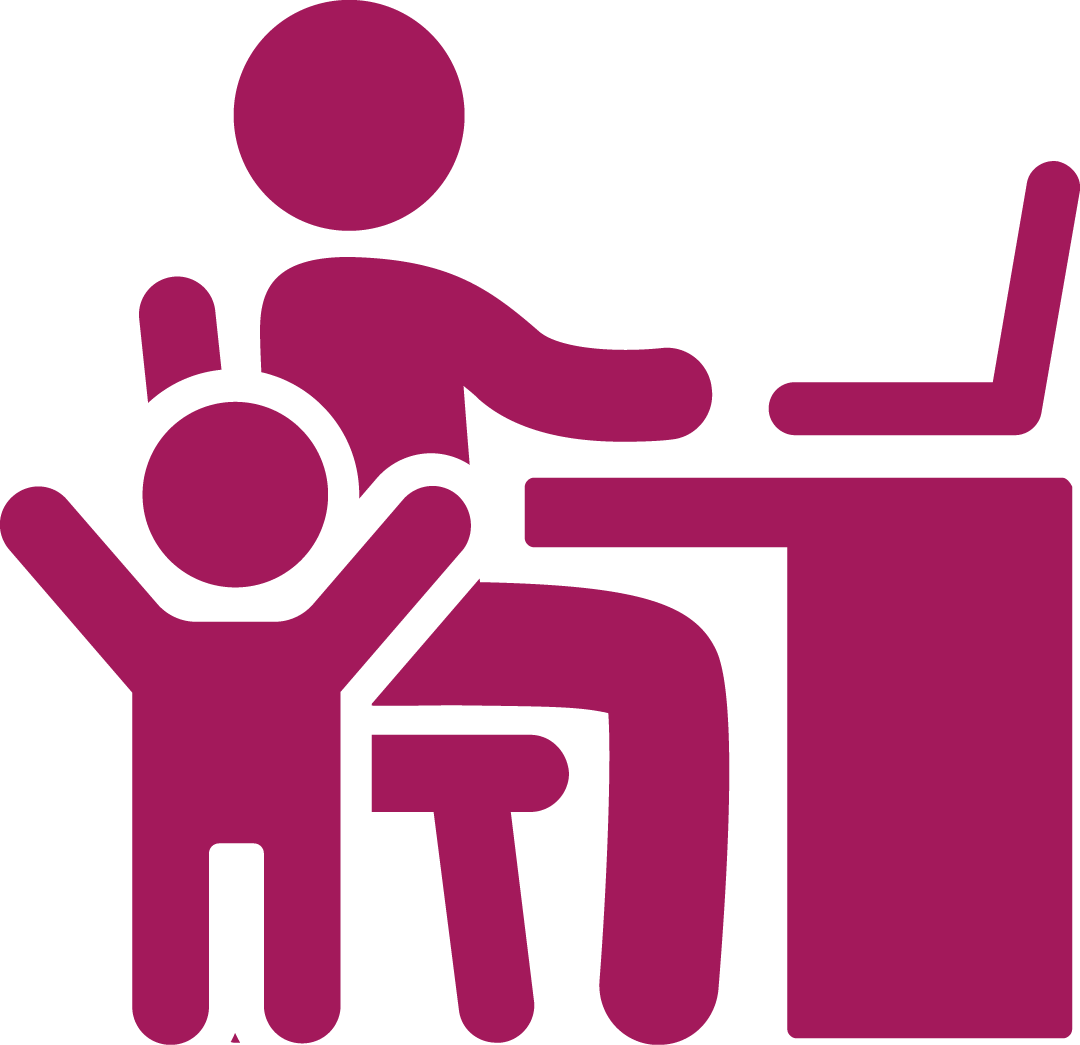 Childcare
Childcare
 Sleep
Sleep